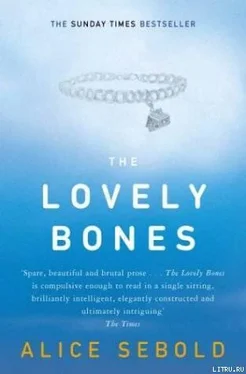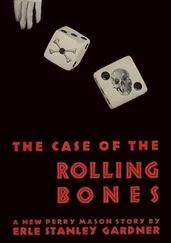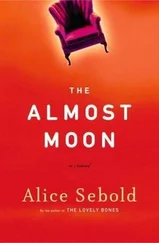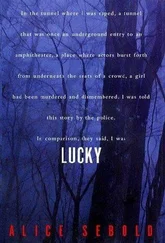“Don’t know what your father would make of them, but we can keep them, just you and me.”
She had a secret stash of things that she never showed his father.
“Do you want the eye or the heart?”
“The eye,” he said.
“I think these roses are fresh enough to save, nice for the truck.”
That night they slept in the truck, unable to make the drive back to where his father was working a temporary job splitting and riving boards by hand.
The two of them slept curled into each other as they did with some frequency, making the inside of the cab an awkward nest. His mother, like a dog worrying a blanket, moved around in her seat and fidgeted. George Harvey had realized after earlier struggles that it was best to go limp and let her move him as she wished. Until his mother was comfortable, no one slept.
In the middle of the night, as he was dreaming about the soft insides of the palaces in picture books he’d seen in public libraries, someone banged on the roof, and George Harvey and his mother sat bolt upright. It was three men, looking through the windows in a way George Harvey recognized. It was the way his own father looked when he was drunk sometimes. It had a double effect: the whole gaze was leveled at his mother and simultaneously absented his son.
He knew not to cry out.
“Stay quiet. They aren’t here for you,” she whispered to him. He began to shiver underneath the old army blankets that covered them.
One of the three men was standing in front of the truck. The other two were banging on either side of the truck’s roof, laughing and lolling their tongues.
His mother shook her head vehemently, but this only enraged them. The man blocking the truck started rocking his hips back and forth against the front end, which caused the other two men to laugh harder.
“I’m going to move slow,” his mother whispered, “and pretend I’m getting out of the truck. I want you to reach forward and turn the keys in the ignition when I say so.”
He knew he was being told something very important. That she needed him. Despite her practiced calm, he could hear the metal in her voice, the iron breaking up through fear now.
She smiled at the men, and as they sent up whoops and their bodies relaxed, she used her elbow to knock the gear shift into place. “Now,” she said in a flat monotone, and George Harvey reached forward and turned the keys. The truck came to life with its rumbling old engine.
The faces of the men changed, fading from an acquisitive joy and then, as she reversed back to a good degree and they stared after her, uncertainty. She switched into drive and screamed, “On the floor!” to her son. He could feel the bump of the man’s body hitting the truck only a few feet from where he lay curled up inside. Then the body was pitched up onto the roof. It lay there for a second until his mother reversed again. He had had a moment of clarity about how life should be lived: not as a child or as a woman. They were the two worst things to be.
His heart had beat wildly as he watched Lindsey make for the elderberry hedge, but then immediately he had calmed. It was a skill his mother, not his father, had taught him – to take action only after calculating the worst possible outcome of each choice available. He saw the notebook disturbed and the missing page in his sketchbook. He checked the bag with the knife. He took the knife with him to the basement and dropped it down the square hole that was drilled through the foundation. From the metal shelving, he retrieved the group of charms that he kept from the women. He took the Pennsylvania keystone charm from my bracelet and held it in his hand. Good luck. The others he spread out on his white handkerchief, and then he brought the four ends together to form a small hobo sack. He put his hand inside the hole under the foundation and got down on the floor on his stomach to push his arm in all the way to the shoulder. He groped, feeling with the free fingers of his hand as the other held the hobo sack, until he found a rusty jut of a metal support over which the workmen had poured the cement. He hung his trophy bag there and then withdrew his arm and stood. The book of sonnets he had buried earlier that summer in the woods of Valley Forge Park, shedding evidence slowly as he always did; now, he had to hope, not too slowly.
Five minutes at the most had gone by. That could be accounted for by shock and anger. By checking what everyone else thought to be valuables – his cuff links, his cash, his tools. But he knew no more time than that could be overlooked. He had to call the police.
He worked himself up. He paced briefly, drew his breath in and out rapidly, and when the operator answered he set his voice on edge.
“My home has been broken into. I need the police,” he said, scripting the opening of his version of the story as inside he calculated how quickly he could leave and what he would carry with him.
When my father called the station, he requested Len Fenerman. But Fenerman couldn’t be located. My father was informed that two uniforms had already been sent out to investigate. What they found when Mr. Harvey answered his door was a man who was tearfully upset and who in every aspect, save a certain repellent quality that the officers attributed to the sight of a man allowing himself to cry, seemed to be responding rationally to the reported events.
Even though the information about the drawing Lindsey had taken had come in over the radio, the officers were more impressed by Mr. Harvey’s readily volunteering to have his home searched. He also seemed sincere in his sympathy for the Salmon family.
The officers grew uncomfortable. They searched the house perfunctorily and found nothing except both the evidence of what they took to be extreme loneliness and a room full of beautiful dollhouses on the second floor, where they switched topics and asked him how long he had been building them.
They noticed, they said later, an immediate and friendly change in his demeanor. He went into his bedroom and got the sketchbook, not mentioning any stolen drawing. The police took note of his increasing warmth as he showed them the sketches for the dollhouses. They asked their next question delicately.
“Sir,” an officer said, “we can take you down to the station for further questioning, and you do have the right to have a lawyer present but -”
Mr. Harvey interrupted him. “I would be happy to answer anything here. I am the wronged party, though I have no wish to press charges against that poor girl.”
“The young woman that broke in,” the other officer began, “she did take something. It was a drawing of the cornfield and a sort of structure in it…”
The way it hit Harvey, the officers would tell Detective Fenerman, was all at once and very convincing. He had an explanation that fit so perfectly, they did not see him as a flight risk – largely because they did not see him first and foremost as a murderer.
“Oh, the poor girl,” he said. He placed his fingers to his pursed lips. He turned to his sketchbook and nipped through it until he came to a drawing that was very much like the one Lindsey had taken.
“There, it was a drawing similar to this one, correct?” The officers – now audience – nodded. “I was trying to figure it out,” Mr. Harvey confessed. “I admit the horror of it has obsessed me. I think everyone in the neighborhood has tried to think how they could have prevented it. Why they didn’t hear something, see something. I mean, surely the girl screamed.
“Now here,” he said to the two men, pointing to his drawing with a pen. “Forgive me, but I think in structures, and after hearing about how much blood there was in the cornfield and the churned-up nature of that area where it was found, I decided that perhaps…” He looked at them, checking their eyes. Both officers were following him. They wanted to follow him. They had had no leads, no body, no clues. Perhaps this strange man had a workable theory. “Well, that the person who did it had built something underground, a hole, and then I confess I began to worry at it and detail it the way I do the dollhouses, and I gave it a chimney and a shelf, and, well, that’s just my habit.” He paused. “I have a lot of time to myself.”
Читать дальше












